Science and technology are the way of survival
Speaking at the ceremony to celebrate the 80th anniversary of the Post and Telecommunications sector (BC&VT), the 66th anniversary of the Science and Technology sector and the 1st Patriotic Emulation Congress of the Ministry of Science and Technology taking place on the afternoon of September 29, on behalf of the Party and State leaders, General Secretary To Lam sent his best regards and congratulations to the leaders, former leaders, revolutionary veterans, scientists, businessmen, and all generations of cadres, civil servants, public employees, and workers of the Post and Telecommunications sector, Science and Technology.
General Secretary To Lam recalled that even before gaining power, our Party had paid special attention to the work of transportation, communications, and science and technology. On August 15, 1945, in Tan Trao, the National Conference of the Indochinese Communist Party decided to establish the specialized Transportation Committee, an event that laid the first foundation for the Vietnam Postal Industry.
Just over a year later, on December 19, 1946, at the Ho Bo Post Office (Hanoi), a telegraph signal issued a nationwide resistance order, transmitting the strength of national unity to stand up against colonial invaders. Tens of thousands of postal workers and information soldiers spared no effort to keep the "information bloodline" open, contributing decisively to the victory of the revolution.
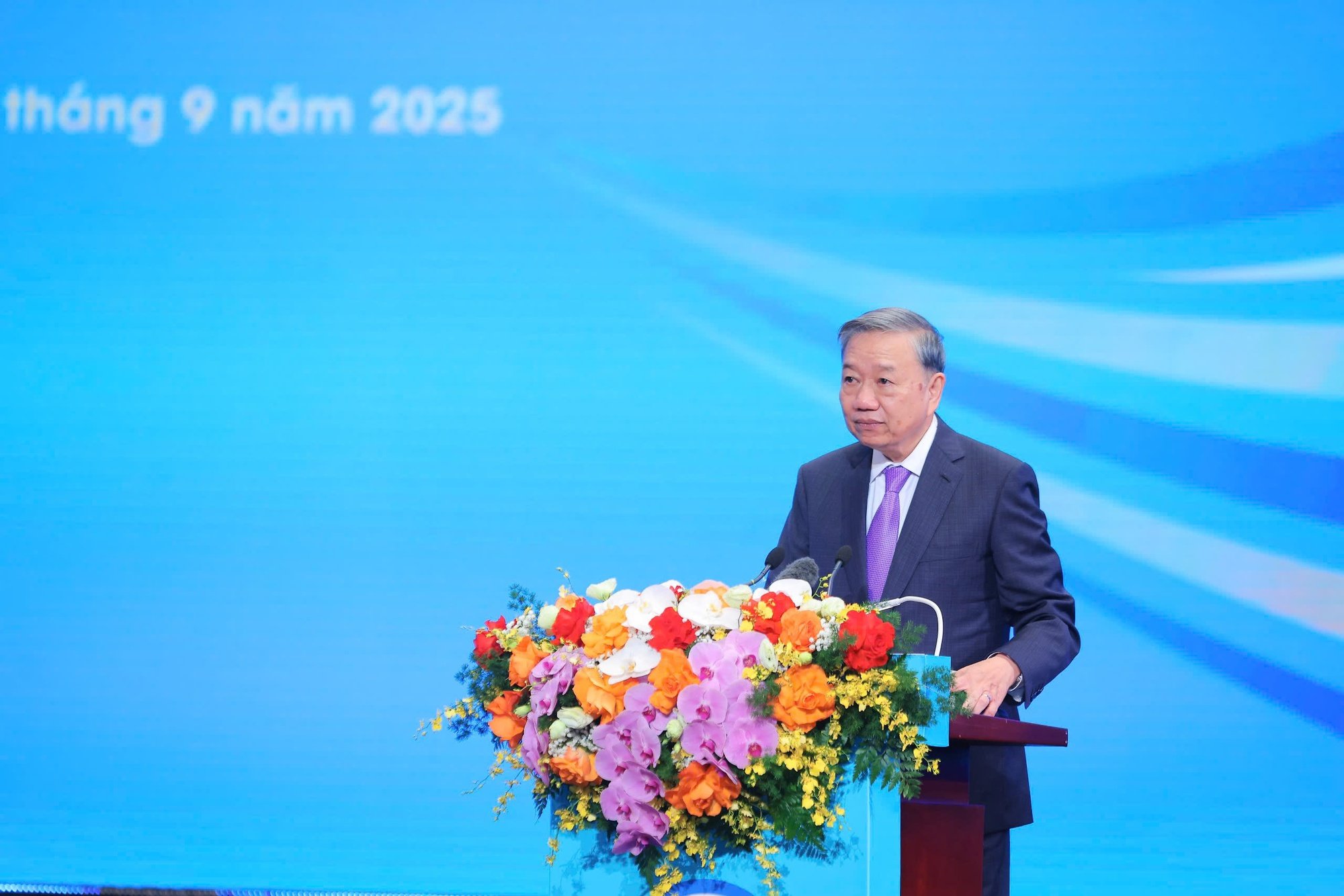
General Secretary To Lam speaks at the ceremony.
During the resistance war against the US, the communication lines and postal delivery system crossed forests, mountains, and bombs to ensure smooth command from the Central to the battlefield. Along with that, Vietnamese scientists and engineers researched and manufactured weapons, medicines, and production tools day and night, contributing directly to the victory on the front lines.
Quoting Uncle Ho's advice that "Communication is the most important thing in revolutionary work" and "Science must come from production and must return to serve production and the masses", the General Secretary emphasized that these teachings have guided and fostered the tradition of bravery in war, intelligence in research, creativity in work, and the will to self-reliance and self-improvement - invaluable assets of generations.
According to the General Secretary, after nearly 40 years of renovation, our country has made remarkable progress, from a poor, embargoed country to the 4th largest economy in Southeast Asia, 32nd in the world, deeply integrated into the global value chain. In that common achievement, the Post and Telecommunications and Science and Technology sectors have made very important contributions.
The Post and Telecommunications sector has been at the forefront of network digitalization, bringing the Internet to Vietnam since 1997, opening up a new space for learning, production, business, entertainment, and integration. Up to now, the network has widespread coverage, 4G has reached nearly 100% of the population, 5G is being deployed and Vietnam is among the few countries that have successfully designed and manufactured 5G equipment. The postal service is increasingly modern, applying digital technology to become the infrastructure for e-commerce and logistics.
The science and technology sector has achieved many outstanding achievements: Researching high-yield rice varieties, contributing to making Vietnam one of the pillars of global food security; mastering vaccine production technology that meets international standards; successfully performing many complex organ transplants... Vietnam has also been in the group of middle-income countries with the fastest improvement in rankings according to the Global Innovation Index (GII) for many consecutive years.
"Those achievements prove that: When the country has the right direction, when the Party's will blends with the people's will, when Vietnamese intelligence is awakened, we can do things that seem impossible," the General Secretary affirmed.
Strategic Decision: Merge for Development
On March 1, 2025, the two sectors of Post and Telecommunications and Science and Technology officially merged to form the Ministry of Science and Technology. This is a strategic decision, demonstrating the vision of the Party and State: unifying focal points, combining resources, improving leadership and management efficiency, so that science and technology, innovation and digital transformation become the central driving force of development.
The General Secretary emphasized: "Unify to concentrate, avoid dispersion; so that each investment resource is used effectively; so that businesses, scientists, and people have a reliable address to accompany and support."
This is an important step to realize Resolution 57 of the Politburo, making science and technology, innovation and digital transformation a breakthrough national policy in the new development period.
The General Secretary said that an overarching and consistent task is for the Ministry of Science and Technology to take the lead in organizing the successful implementation of Resolution 57 of the Politburo with all the key directions and tasks included in the Resolution.
The important issue now is to focus on drastic actions, concretizing them with practical and effective work, creating clear changes in practice, and spreading strongly throughout society.
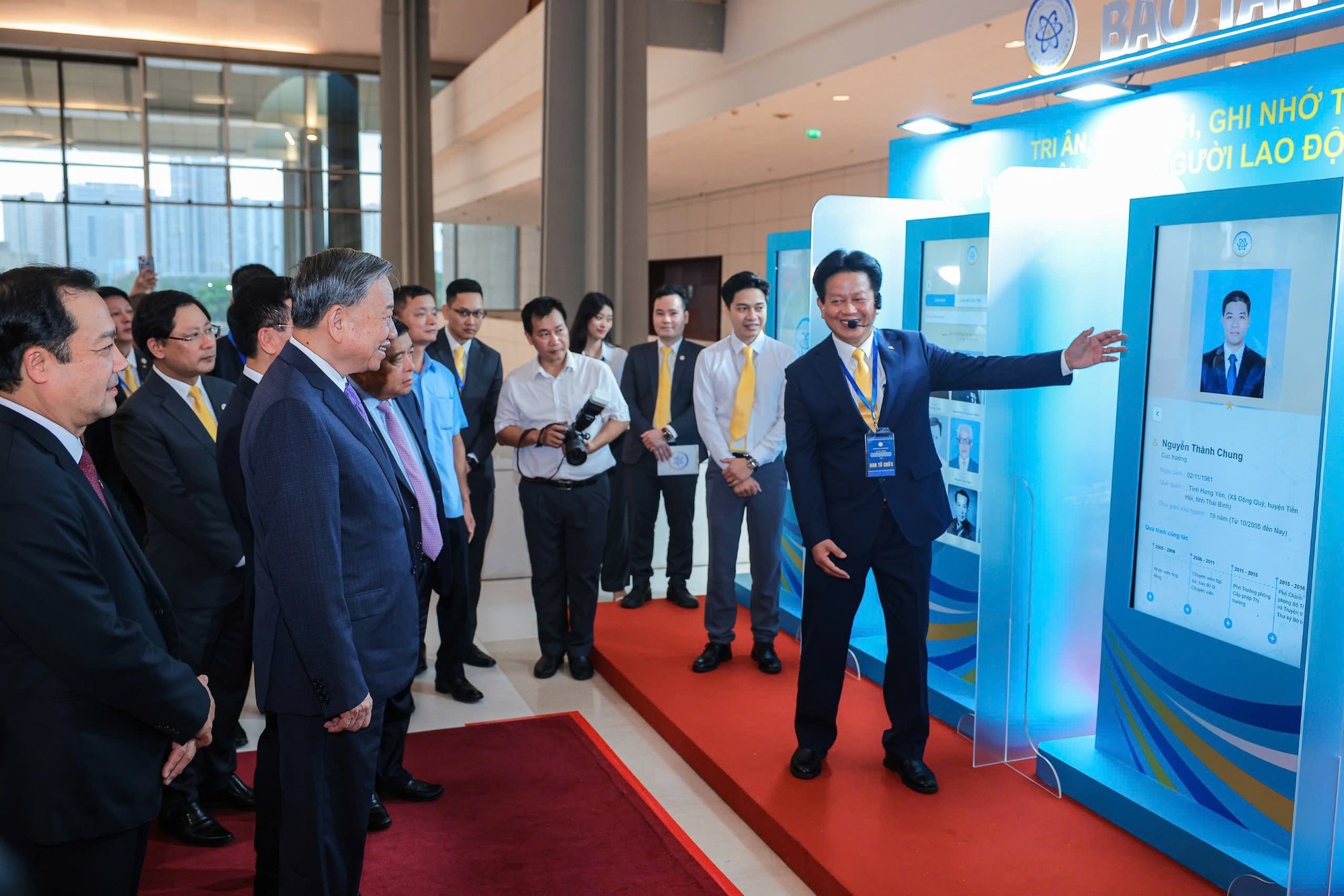
General Secretary To Lam and delegates visit the exhibition booth.
Three key pillars of the Ministry of Science and Technology
To do that, among the many tasks of Resolution 57, General Secretary To Lam emphasized three key pillars that the Ministry and the science and technology sector need to focus on in the coming time.
Firstly: Regarding breakthrough institutions and favorable environment, with advisory and creative functions, the Ministry must proactively propose and perfect the legal system, mechanisms and policies to encourage innovation and promote digital transformation.
General Secretary To Lam emphasized: "Institutions are not only for management, but also for unleashing resources, turning potential into reality, turning Vietnamese intelligence into products, technology, and added value. It is necessary to quickly issue outstanding policies, have testing mechanisms for new technologies; at the same time, boldly empower and protect those who dare to think, dare to do, dare to take responsibility for the common good."
Second: Regarding core technology, digital infrastructure and spearhead industries, with the state management function, the Ministry must orient and lead the development of spearhead technology fields of strategic significance such as semiconductor industry, artificial intelligence, biotechnology, new materials, nuclear energy for peaceful purposes, ensuring energy security, serving green and sustainable development...
At the same time, focus on building a modern, synchronous, and secure national digital infrastructure, considering it the central nervous system of national governance and the development of the digital economy and digital society. In choosing technology, do not chase after cheap, outdated solutions but be determined to take shortcuts, take the lead, access advanced technology, and participate deeply in the global value chain.
Third: Regarding resources, human resources and innovation ecosystem, with the function of connection and coordination, the Ministry must promote the mobilization and effective use of resources for science and technology; increase the proportion of budget expenditure and encourage enterprises and venture capital funds to participate.
Investment in science and technology, innovation and digital transformation must be considered a long-term strategy, accepting delays and risks, but must be steadfastly pursued because it is an investment for the future.
At the same time, there must be a special mechanism to attract and utilize domestic and foreign talents; encourage creative start-ups, and link university and postgraduate training with practical needs. Enterprises need to truly become the center of the innovation ecosystem, the subject of solving the "big problems" of the country; institutes and schools are the foundation, and intellectuals and talents are the driving force.
According to General Secretary To Lam, the 80-year history of the Post and Telecommunications sector, and the 66-year history of the Science and Technology sector, is a history of heroic traditions, creativity, dedication and sacrifice. That spirit today needs to be strongly aroused in the patriotic emulation movement, so that each person and each organization can strive for the common goal: A strong and prosperous Vietnam.
The emulation movement must be specific, practical, linked to results, avoiding formality. Each year, each unit must register and implement at least one initiative, one innovative project that has a direct impact on socio-economic development and improving people's lives.
The General Secretary called on every agency, every scientist, every enterprise to compete with specific and practical initiatives, projects and products. That is the best way to turn the patriotic emulation movement into a vivid reality.
According to the General Secretary, our country is facing a historic opportunity. Science and technology, innovation and digital transformation are not just choices, but the vital path to rapid and sustainable development. This is the golden key to realizing the aspiration of a strong and prosperous Vietnam by 2045.
With its glorious tradition, spirit of solidarity and creativity, the General Secretary expressed his belief that the science and technology sector will continue to be a pioneer and worthy of being the central driving force of the industrialization and modernization cause, bringing Vietnam steadily forward.
Source: https://mst.gov.vn/tong-bi-thu-nhan-manh-ba-tru-cot-then-chot-voi-nganh-khoa-hoc-va-cong-nghe-197250929195709079.htm



![[Photo] General Secretary To Lam receives US Ambassador to Vietnam Marc Knapper](https://vphoto.vietnam.vn/thumb/1200x675/vietnam/resource/IMAGE/2025/9/29/c8fd0761aa184da7814aee57d87c49b3)
![[Photo] General Secretary To Lam attends the ceremony to celebrate the 80th anniversary of the post and telecommunications sector and the 66th anniversary of the science and technology sector.](https://vphoto.vietnam.vn/thumb/1200x675/vietnam/resource/IMAGE/2025/9/29/8e86b39b8fe44121a2b14a031f4cef46)
![[Photo] General Secretary To Lam chairs the meeting of the Central Steering Committee on preventing and combating corruption, waste and negativity](https://vphoto.vietnam.vn/thumb/1200x675/vietnam/resource/IMAGE/2025/9/29/fb2a8712315d4213a16322588c57b975)
![[Photo] Many streets in Hanoi were flooded due to the effects of storm Bualoi](https://vphoto.vietnam.vn/thumb/1200x675/vietnam/resource/IMAGE/2025/9/29/18b658aa0fa2495c927ade4bbe0096df)
![[Photo] National Assembly Chairman Tran Thanh Man chairs the 8th Conference of full-time National Assembly deputies](https://vphoto.vietnam.vn/thumb/1200x675/vietnam/resource/IMAGE/2025/9/29/2c21459bc38d44ffaacd679ab9a0477c)












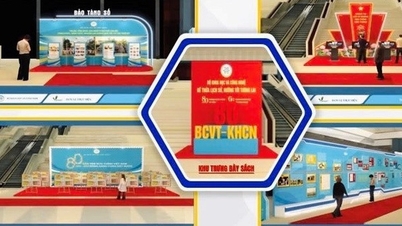
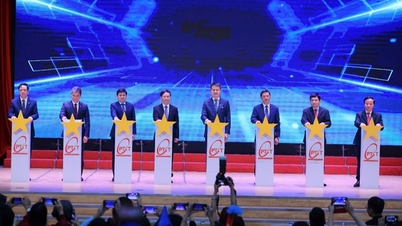
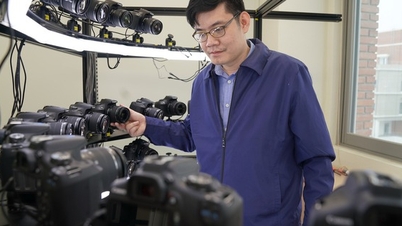

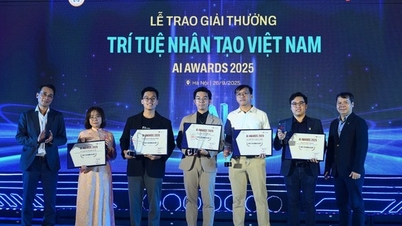













































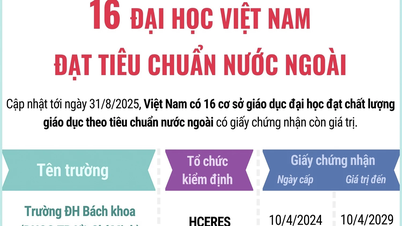



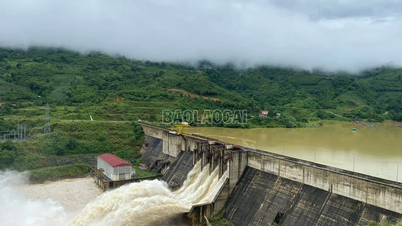


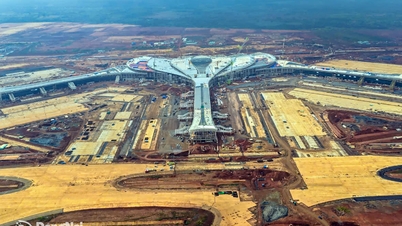














Comment (0)